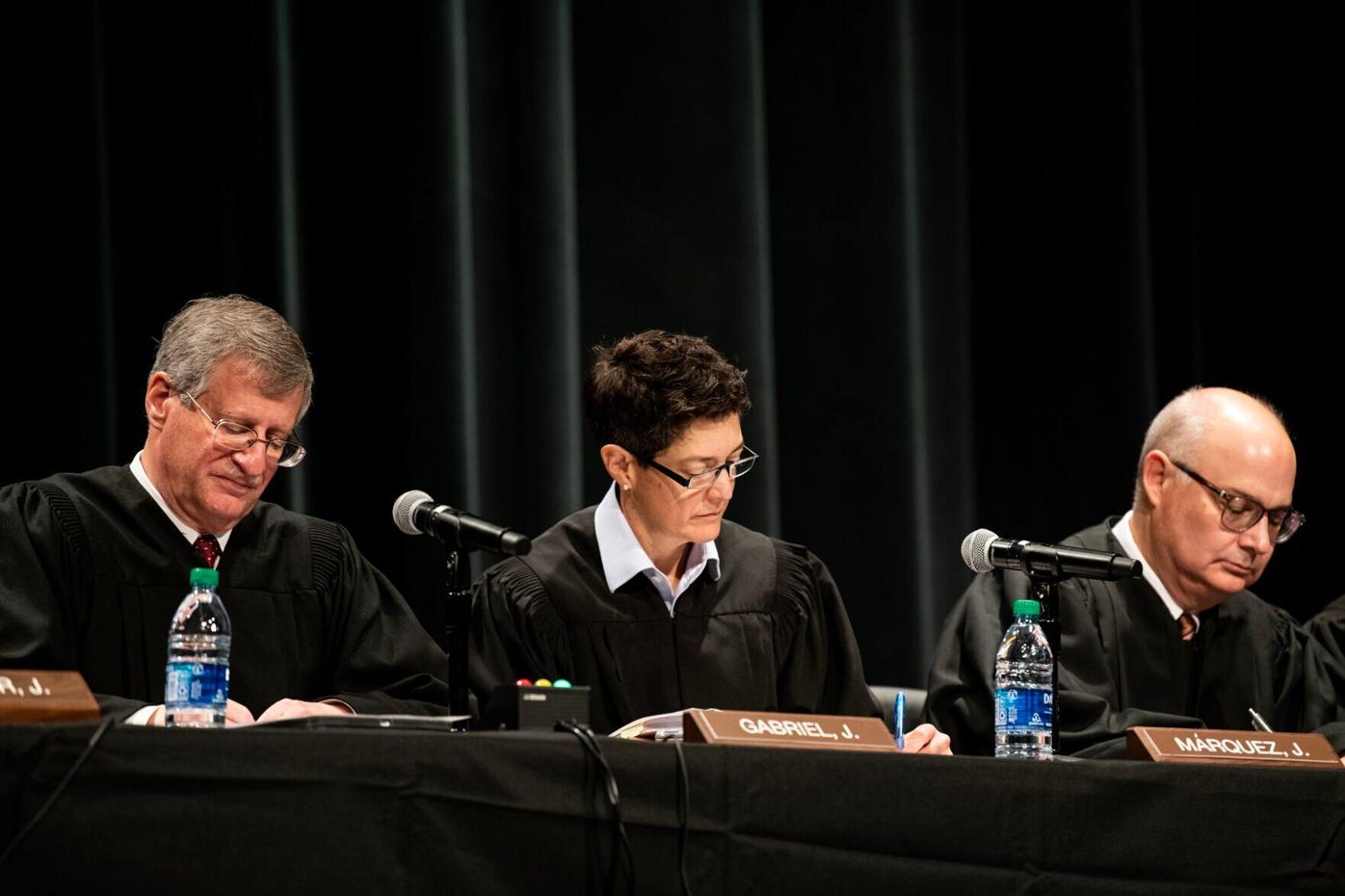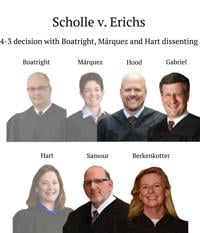Colorado justices, 4-3, uphold Denver jury’s $9.2 million award for botched surgery
The Colorado Supreme Court, in a divided ruling on Monday, left in place a Denver jury’s award of more than $9.2 million to a man severely injured after his back surgery at Sky Ridge Medical Center went wrong.
Although Colorado law limits damages in medical malpractice cases to $1 million, it is possible for a judge to override the cap upon a finding of good cause. Relatedly, a “contract exception” in state law prevents jury awards from being lowered when the injured party is compensated as the result of a contract — like an agreement with a health insurance company.
Taking those two principles together, the question for the Supreme Court was whether Daniel B. Scholle’s trial judge should have considered the payments his insurance made for his medical bills, which Scholle did not need to repay, when deciding whether good cause existed to override the $1 million cap.
No, that information was irrelevant, concluded Justice Maria E. Berkenkotter for the majority.
“To the extent either party receives a windfall, the General Assembly has clearly decided that allowing an injured plaintiff to benefit from their insurance contract is the lesser evil,” she wrote in the April 22 opinion. “Without question, there are compelling public policy concerns on both sides of this case. At the end of the day, however, we think it’s the General Assembly’s role — not this court’s — to weigh those concerns.”
Justice Monica M. Márquez dissented, believing it was proper to give judges the ability to consider the fact plaintiffs owe nothing to their health insurance company when deciding whether it would be unfair to limit the jury’s award to $1 million.
“My broader point is that a trial court may consider a plaintiff’s contracted-for benefits in evaluating the unfairness,” she wrote for herself, Chief Justice Brian D. Boatright and Justice Melissa Hart. “This does not mean that the court must consider those benefits, or that the court must give those benefits special weight. It merely adds to the factors the court may consider.”


Scholle, who died in 2022, incurred major injuries during his surgery, requiring a 100-day stay in the intensive care unit. He filed a medical malpractice lawsuit against the hospital operator, HCA-HealthONE, and the two doctors who operated on him. After a 22-day trial, jurors awarded him more than $9.2 million, including $6 million for his past medical bills and $2.6 million for future expenses.
Scholle asked then-District Court Judge Robert L. McGahey Jr. to override the $1 million cap in state law. In response, McGahey cited six reasons why good cause existed to do so, including Scholle’s inability to ever work again, increasing medical costs later in life and the severity of Scholle’s injuries.
The defendants appealed, and a three-judge panel of the Court of Appeals largely rejected their arguments, only slightly reducing the jury’s award. The judges also agreed McGahey had provided five acceptable reasons for awarding the full $9.2 million to Scholle.
However, the panel’s majority believed McGahey’s sixth reason — Scholle needed to repay the costs of his medical care — was questionable because Scholle appeared to owe nothing further on account of his insurance. The majority decided McGahey should not have considered that factor and ordered a new judge to reevaluate whether exceeding the $1 million cap was fair.
Then-Judge Michael H. Berger, writing in dissent, invoked the contract exception for calculating damages, arguing “our job is to apply the statute, not create a judge-made exception because it may be better policy.” He added that McGahey’s five other, uncontested reasons separately justified the jury’s award.
To the Supreme Court, lawyers for Scholle’s widow, Susan Ann Scholle, told the justices during oral arguments that the hospital collected more than $1 million from Daniel Scholle’s insurance, and would actually profit from its negligence if it only had to pay $1 million at the conclusion of the case.
Theresa Wardon Benz, an attorney for the defendants, acknowledged it “does feel inequitable” if Scholle’s past medical bills were subtracted from the jury’s award. But she argued the General Assembly decided that was the desirable outcome nearly 40 years ago when it capped damages at $1 million.
“How is that fair?” Justice Richard L. Gabriel pressed. “I mean, this man died.”

From left, Colorado Supreme Court Justices Richard L. Gabriel and Monica M. Márquez and Chief Justice Brian D. Boatright listen to an argument during a Courts in the Community session held at Pine Creek High School in Colorado Springs on Thursday, Nov. 17, 2022. (The Gazette, Parker Seibold)
Parker Seibold

From left, Colorado Supreme Court Justices Richard L. Gabriel and Monica M. Márquez and Chief Justice Brian D. Boatright listen to an argument during a Courts in the Community session held at Pine Creek High School in Colorado Springs on Thursday, Nov. 17, 2022. (The Gazette, Parker Seibold)
Berkenkotter, in the majority opinion, agreed with Scholle that the contract exception prevents wrongdoers from escaping liability when their damages are paid for by another source — in this case, the insurance benefits Scholle received in exchange for paying his premiums.
“The contract exception didn’t simply slip through the cracks of the General Assembly’s 1980s tort reform legislation,” she wrote. “If the General Assembly didn’t intend for it to apply to (medical malpractice suits), it could have said something to that effect from the get-go.”
Berkenkotter agreed reducing Scholle’s award to $1 million, after his insurance paid HCA-HealthONE in excess of $1 million for his treatment, meant the defendants would essentially profit from injuring him. Consequently, the majority declined to order a reconsideration of the jury’s award.
Márquez emphasized in dissent that her alternative reading of the law would not automatically result in Scholle’s award being slashed to $1 million. Instead, she advocated for judges to have the flexibility to consider whether plaintiffs owe their insurers anything before deciding to override the cap.
“Where the plaintiff has no evidence of outstanding payment obligations, a trial court should not be forced to put a thumb on the scale in favor of the plaintiff by assuming that such obligations exist,” Márquez wrote.
The case is Scholle v. Ehrichs et al.






